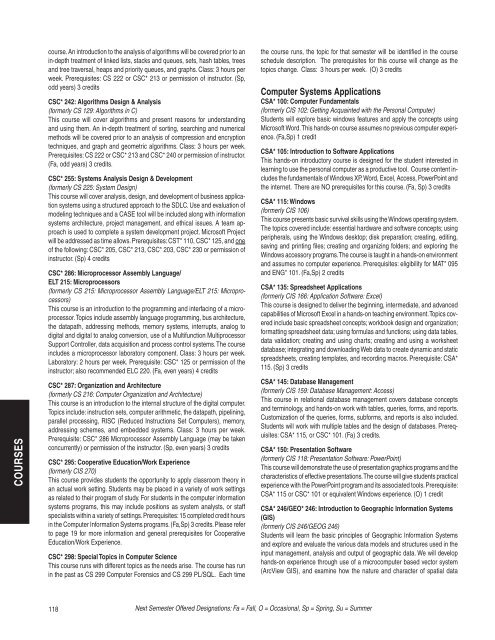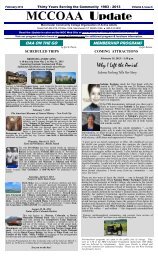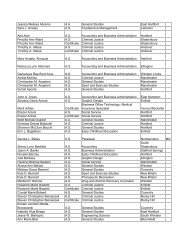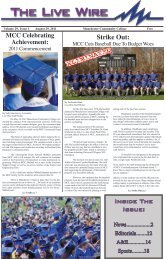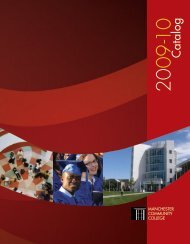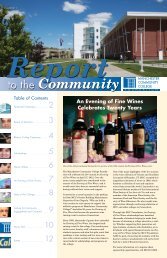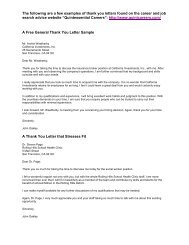Liberal Arts and Science - Manchester Community College ...
Liberal Arts and Science - Manchester Community College ...
Liberal Arts and Science - Manchester Community College ...
Create successful ePaper yourself
Turn your PDF publications into a flip-book with our unique Google optimized e-Paper software.
COURSES<br />
course. An introduction to the analysis of algorithms will be covered prior to an<br />
in-depth treatment of linked lists, stacks <strong>and</strong> queues, sets, hash tables, trees<br />
<strong>and</strong> tree traversal, heaps <strong>and</strong> priority queues, <strong>and</strong> graphs. Class: 3 hours per<br />
week. Prerequisites: CS 222 or CSC* 213 or permission of instructor. (Sp,<br />
odd years) 3 credits<br />
CSC* 242: Algorithms Design & Analysis<br />
(formerly CS 129: Algorithms in C)<br />
This course will cover algorithms <strong>and</strong> present reasons for underst<strong>and</strong>ing<br />
<strong>and</strong> using them. An in-depth treatment of sorting, searching <strong>and</strong> numerical<br />
methods will be covered prior to an analysis of compression <strong>and</strong> encryption<br />
techniques, <strong>and</strong> graph <strong>and</strong> geometric algorithms. Class: 3 hours per week.<br />
Prerequisites: CS 222 or CSC* 213 <strong>and</strong> CSC* 240 or permission of instructor.<br />
(Fa, odd years) 3 credits.<br />
CSC* 255: Systems Analysis Design & Development<br />
(formerly CS 225: System Design)<br />
This course will cover analysis, design, <strong>and</strong> development of business application<br />
systems using a structured approach to the SDLC. Use <strong>and</strong> evaluation of<br />
modeling techniques <strong>and</strong> a CASE tool will be included along with information<br />
systems architecture, project management, <strong>and</strong> ethical issues. A team approach<br />
is used to complete a system development project. Microsoft Project<br />
will be addressed as time allows. Prerequisites: CST* 110, CSC* 125, <strong>and</strong> one<br />
of the following: CSC* 205, CSC* 213, CSC* 203, CSC* 230 or permission of<br />
instructor. (Sp) 4 credits<br />
CSC* 286: Microprocessor Assembly Language/<br />
ELT 215: Microprocessors<br />
(formerly CS 215: Microprocessor Assembly Language/ELT 215: Microprocessors)<br />
This course is an introduction to the programming <strong>and</strong> interfacing of a microprocessor.<br />
Topics include assembly language programming, bus architecture,<br />
the datapath, addressing methods, memory systems, interrupts, analog to<br />
digital <strong>and</strong> digital to analog conversion, use of a Multifunction Multiprocessor<br />
Support Controller, data acquisition <strong>and</strong> process control systems. The course<br />
includes a microprocessor laboratory component. Class: 3 hours per week.<br />
Laboratory: 2 hours per week. Prerequisite: CSC* 125 or permission of the<br />
instructor; also recommended ELC 220. (Fa, even years) 4 credits<br />
CSC* 287: Organization <strong>and</strong> Architecture<br />
(formerly CS 216: Computer Organization <strong>and</strong> Architecture)<br />
This course is an introduction to the internal structure of the digital computer.<br />
Topics include: instruction sets, computer arithmetic, the datapath, pipelining,<br />
parallel processing, RISC (Reduced Instructions Set Computers), memory,<br />
addressing schemes, <strong>and</strong> embedded systems. Class: 3 hours per week.<br />
Prerequisite: CSC* 286 Microprocessor Assembly Language (may be taken<br />
concurrently) or permission of the instructor. (Sp, even years) 3 credits<br />
CSC* 295: Cooperative Education/Work Experience<br />
(formerly CIS 270)<br />
This course provides students the opportunity to apply classroom theory in<br />
an actual work setting. Students may be placed in a variety of work settings<br />
as related to their program of study. For students in the computer information<br />
systems programs, this may include positions as system analysts, or staff<br />
specialists within a variety of settings. Prerequisites: 15 completed credit hours<br />
in the Computer Information Systems programs. (Fa,Sp) 3 credits. Please refer<br />
to page 19 for more information <strong>and</strong> general prerequisites for Cooperative<br />
Education/Work Experience.<br />
CSC* 298: Special Topics in Computer <strong>Science</strong><br />
This course runs with different topics as the needs arise. The course has run<br />
in the past as CS 299 Computer Forensics <strong>and</strong> CS 299 PL/SQL. Each time<br />
118<br />
the course runs, the topic for that semester will be identified in the course<br />
schedule description. The prerequisites for this course will change as the<br />
topics change. Class: 3 hours per week. (O) 3 credits<br />
Computer Systems Applications<br />
CSA* 100: Computer Fundamentals<br />
(formerly CIS 102: Getting Acquainted with the Personal Computer)<br />
Students will explore basic windows features <strong>and</strong> apply the concepts using<br />
Microsoft Word. This h<strong>and</strong>s-on course assumes no previous computer experience.<br />
(Fa,Sp) 1 credit<br />
CSA* 105: Introduction to Software Applications<br />
This h<strong>and</strong>s-on introductory course is designed for the student interested in<br />
learning to use the personal computer as a productive tool. Course content includes<br />
the fundamentals of Windows XP, Word, Excel, Access, PowerPoint <strong>and</strong><br />
the internet. There are NO prerequisites for this course. (Fa, Sp) 3 credits<br />
CSA* 115: Windows<br />
(formerly CIS 106)<br />
This course presents basic survival skills using the Windows operating system.<br />
The topics covered include: essential hardware <strong>and</strong> software concepts; using<br />
peripherals, using the Windows desktop; disk preparation; creating, editing,<br />
saving <strong>and</strong> printing files; creating <strong>and</strong> organizing folders; <strong>and</strong> exploring the<br />
Windows accessory programs. The course is taught in a h<strong>and</strong>s-on environment<br />
<strong>and</strong> assumes no computer experience. Prerequisites: eligibility for MAT* 095<br />
<strong>and</strong> ENG* 101. (Fa,Sp) 2 credits<br />
CSA* 135: Spreadsheet Applications<br />
(formerly CIS 166: Application Software: Excel)<br />
This course is designed to deliver the beginning, intermediate, <strong>and</strong> advanced<br />
capabilities of Microsoft Excel in a h<strong>and</strong>s-on teaching environment. Topics covered<br />
include basic spreadsheet concepts; workbook design <strong>and</strong> organization;<br />
formatting spreadsheet data; using formulas <strong>and</strong> functions; using data tables,<br />
data validation; creating <strong>and</strong> using charts; creating <strong>and</strong> using a worksheet<br />
database; integrating <strong>and</strong> downloading Web data to create dynamic <strong>and</strong> static<br />
spreadsheets, creating templates, <strong>and</strong> recording macros. Prerequisite: CSA*<br />
115. (Sp) 3 credits<br />
CSA* 145: Database Management<br />
(formerly CIS 159: Database Management: Access)<br />
This course in relational database management covers database concepts<br />
<strong>and</strong> terminology, <strong>and</strong> h<strong>and</strong>s-on work with tables, queries, forms, <strong>and</strong> reports.<br />
Customization of the queries, forms, subforms, <strong>and</strong> reports is also included.<br />
Students will work with multiple tables <strong>and</strong> the design of databases. Prerequisites:<br />
CSA* 115, or CSC* 101. (Fa) 3 credits.<br />
CSA* 150: Presentation Software<br />
(formerly CIS 118: Presentation Software: PowerPoint)<br />
This course will demonstrate the use of presentation graphics programs <strong>and</strong> the<br />
characteristics of effective presentations. The course will give students practical<br />
experience with the PowerPoint program <strong>and</strong> its associated tools. Prerequisite:<br />
CSA* 115 or CSC* 101 or equivalent Windows experience. (O) 1 credit<br />
CSA* 246/GEO* 246: Introduction to Geographic Information Systems<br />
(GIS)<br />
(formerly CIS 246/GEOG 246)<br />
Students will learn the basic principles of Geographic Information Systems<br />
<strong>and</strong> explore <strong>and</strong> evaluate the various data models <strong>and</strong> structures used in the<br />
input management, analysis <strong>and</strong> output of geographic data. We will develop<br />
h<strong>and</strong>s-on experience through use of a microcomputer based vector system<br />
(ArcView GIS), <strong>and</strong> examine how the nature <strong>and</strong> character of spatial data<br />
Next Semester Offered Designations: Fa = Fall, O = Occasional, Sp = Spring, Su = Summer


